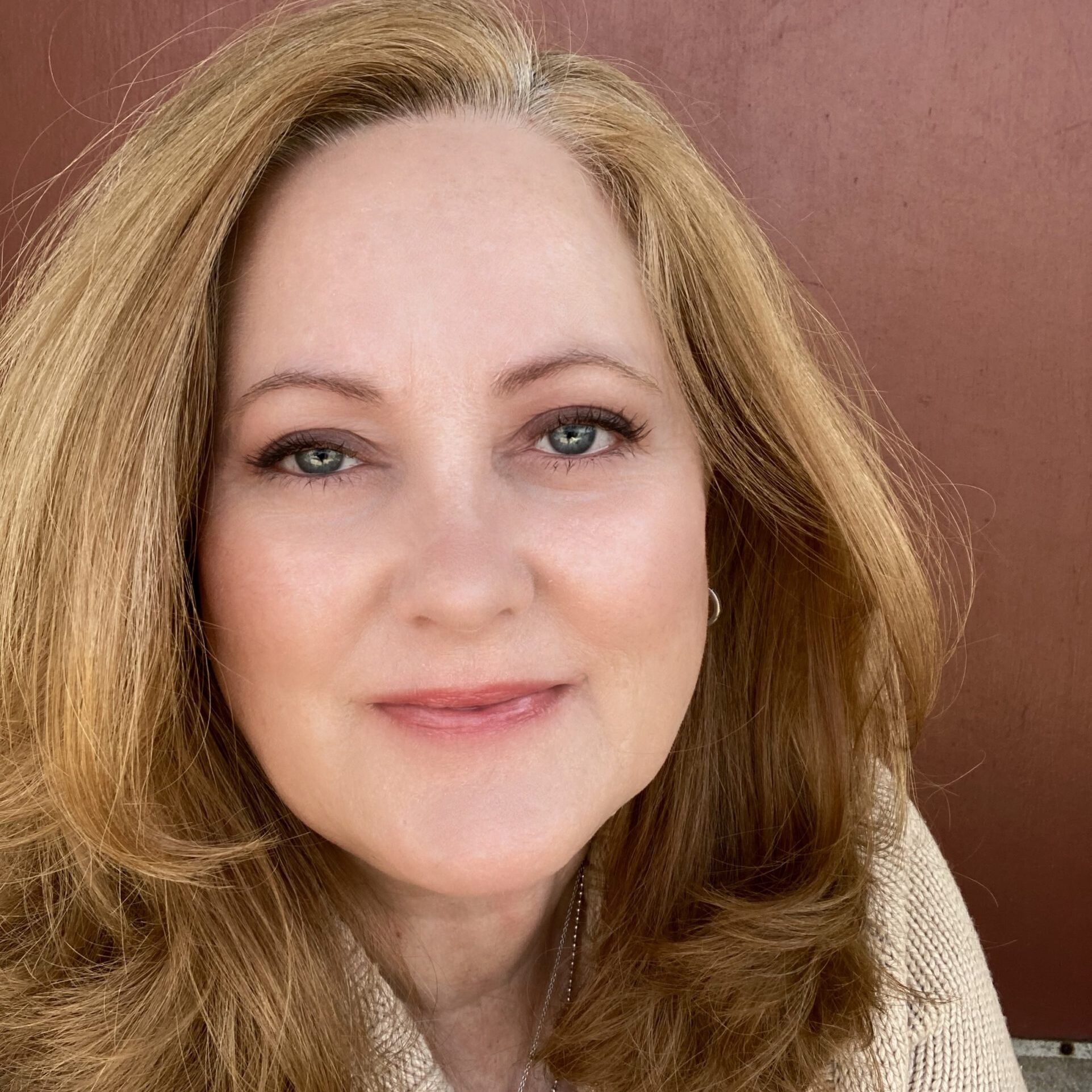San Francisco’s attorney practice is experiencing a transformation, led by a small but mighty BASF program that provides court-appointed counsel to parents and their children in cases filed by Child Protective Services (CPS). Attorneys are now partnering with social workers and people with lived experience on their legal team, drawing upon the wisdom of pioneers in holistic, interdisciplinary representation. BASF Director of Court Programs, Julie Traun notes, “San Francisco is known for our innovation, and this extends to our Superior Court and our legal community – where BASF’s panels of experienced court-appointed lawyers continue to be at the cutting edge of best practices emerging around the nation.”
Here’s the problem they’re addressing: our adversarial court systems are too-often being used as the last social safety net. “The vast majority of Child Protective Services (CPS) cases allege that parents have been neglectful (85 percent of cases), which almost always is tied to poverty,” says Zabrina Aleguire, Manager of BASF’s Dependency Representation Program (DRP). Factors may include insufficient childcare, unaffordable family housing, inadequate mental health services, and/or lack of access to substance abuse treatment. “All too often, our system penalizes families—and especially single parents—when they are at their lowest moment, rather than bolstering them up to handle a really hard life,” she says.
“This is seen especially in how police and child welfare authorities monitor underprivileged families, particularly in Black, Latino, and Indigenous communities, resulting in unequally higher rates of family separation into foster care. Here is where our attorneys and Court-Appointed Family Engagement Specialists [CAFES, pronounced “cafés”] come in,” Aleguire says, “to address those conditions of poverty and to provide parents the encouragement, hands-on assistance, and tools they need to bring their families back together and remove themselves from the system and its inherent surveillance.” (Read more about Aleguire’s views on “Reimagining Child Welfare” in her Spring 2023 article for San Francisco Attorney magazine.)
While the CAFES program is relatively new, the foundation for holistic defense has been laid for years in tribal courts and by attorneys representing parents and children in child welfare cases. Research into similar interdisciplinary representation programs representing parents indicates success. In 2019, Professor Martin Guggenheim and attorney Susan Jacobs published their study of child welfare cases impacting over eighteen thousand children in New York City. Families that received interdisciplinary representation (including a lawyer, social worker, and peer parent advocate) were reunified in the first year at much higher rates, and overall much sooner, than families represented by solo attorneys. As children spent less time in foster care, the city saved nearly $40 million on foster care funds annually, and returned home just as safely.
Who is a CAFES?
A Court Appointed Family Engagement Specialist (CAFES), once appointed by the Court, partners with an attorney to advance the client’s interests outside of court as well. While some CAFES may have previously worked as social workers for child welfare agencies, they serve a different role on the legal team. “CAFESs are not mandated reporters, allowing them to have a completely confidential and trusting relationship with a client” says Erika Ducati, BASF’s Multidisciplinary Representation Program Coordinator who created the CAFES program in collaboration with the Superior Court. Indeed, as agents of lawyers, CAFES adhere to attorney-client ethical duties and maintain complete loyalty to those they serve.
Ducati, a social worker for 25 years, left child welfare social work when she found herself “incredibly disheartened” at what she saw happening with families. She found inspiration again when she learned about holistic representation. “It’s social justice at its best,” she says. “When I learned about holistic representation it immediately made sense as a model for best practice. Support from a team to focus on the well-being of the family as a whole, in addition to the safety of the child, and recognizing that parents are the true experts of their children.” Applying the knowledge she learned from her years of working in child welfare, she now helps educate parents about how to navigate the system successfully – equipping them with skills to take charge of their family’s situation and leverage resources to bring their children home and exit the court system for good.
Ducati’s success building the CAFES program has led to increased use of social workers and case managers by BASF’s other court-appointed panel attorneys in the Adult Criminal and Juvenile Delinquency courts. “This team member is just as important as an investigator or an expert; when we better understand and can mitigate our client’s circumstances leading to arrest and prosecution, we achieve better outcomes and reduce recidivism”, noted Julie Traun. “The importance of interdisciplinary representation,” says Berenice Quirino, Attorney Fellow "is understanding that the needs of clients are never just limited to what’s going on in court. A parent may check off boxes to get their child back, but if you’re able to provide the child and parent with resources through a CAFES—helping address actual issues, not just symptoms—the progression is better.”
Real life experience
When Joey Cordero’s infant daughter was taken from him and her mother into foster care, their separation “was the worst pain I have ever felt,” he shares. “This pain became the fuel that pushed me to my turning point.” Against the odds, Cordero began to “look at this crisis as an opportunity to change,” entering treatment for his drug problem and establishing a stable home for his child. He finally won a court order bringing his daughter home days before her third birthday, after she spent a year apart from him, staying connected through visits three times a week. (See Cordero’s “Engaging Fathers” video produced by the Center for Digital Storytelling). If his daughter had spent six more months in foster care, Cordero’s rights could have been terminated resulting in his daughter being put up for adoption.
Cordero asks, “Do we realize how hard it is and the legal timeline parents are up against? Substance abuse, mental health, housing, domestic violence—a family could be facing all of these issues at the same time.” Aleguire highlights the additional challenge for parents of defending themselves against a government agency that “points out their faults in every court report and even in out-of-court meetings.” “What parent can have hope for their own success in the face of that kind of judgment, without a team of supporters by their side?” she asks.
Families facing CPS intervention “are thrust into difficult situations,” says attorney Christina Campany, and CAFES are “ professionals who understand the system and can empathize with the client while providing no-nonsense instructions how to navigate the system. They will say to the client ‘I understand your frustration; this isn’t right. These are the steps you’ve got to do to get your kids back and your attorney and I are here to help you.’” Cordero, now working as a CAFES, relishes being “an extension of the attorney” and being an “extra pair of arms and ears” to engage with the client regularly, answer questions, and coordinate support within the family’s own network. “They relieve some of the work you may not have the skill set for, the social work aspect,” says attorney Nick Soter, who is a Child Welfare Law Specialist (CWLS) and a member of BASF’s Dependency Panel. “CAFESs have a better perspective and more personalized relationship with the client, and the client can rely on them more for help with the more non-legal topics.” For example, CAFES help clients build their communication within their own support network, as well as teaching conflict management as clients face adversarial contact with other parties, the child welfare agency, and at Court.
I am not a social worker, I’m a litigator,” she says. “I feel good bringing on someone who can support the client and know that I have their back when we need to fight in court.” - Christina Campany
The Foremothers of CAFES
This holistic model is not new to San Francisco. Dora Miranda, a licensed Marriage and Family Therapist, describes her first experience working with a dependency attorney. At the time she was at the UCSF Infant-Parent Program providing mental health services to Spanish speaking clients with children under three years old. In 1989, her husband, attorney Soter introduced her to Judge Abby Abinanti, then a dependency attorney in San Francisco, who later became a commissioner in San Francisco’s dependency court and now is Chief Judge of the Yurok Tribe. “Abby needed a Spanish speaker to interview a little boy in her first dependency case in San Francisco, and Nick volunteered me,” says Miranda. “It was my first case too.” It quickly became clear to Miranda that the attorney’s strengths did not lie in the “touch-feely stuff,” and “I had to figure out what Abby needed and elicit it from this traumatized boy.”
Together, they built what eventually became the Court-Appointed Social Worker program, with support from now retired Judge Donna Hitchens. “The model came from Indian child welfare cases,” Miranda says, “where an attorney was always paired with a social worker.” Miranda and Soter now collaborate on cases, bringing both their skill sets together. “I might flag different things than Nick might, then we’ll prioritize together,” says Miranda.
The Court-Appointed Social Worker program ebbed and flowed over 30 years through budget cuts and shifting ideologies, with no administrative support and little funding. In February 2020, with access to new federal funding streams, long-time dependency attorney Jill McInerney, then BASF’s Dependency Program Manager, invited Ducati to come on board as a consultant, to “build the plane while we fly it.” The two women spent six months creating training for attorneys on the value of interdisciplinary work, ultimately leading to CAFES appointment by the Superior Court in over 200 cases in its first two years.
Campany, an attorney with BASF’s Dependency Panel, was one of the beneficiaries of their efforts. In practice since 1998, she was first introduced to interdisciplinary representation when she was on the Dependency Panel from 2000 to 2007. “I remember hearing about it from Dora,” she says, “but it just wasn’t common practice for panel attorneys to integrate social workers as teammates in those days. I didn’t; I figured I could do what I needed for my client.” Two years ago, she rejoined the panel, learned more about creating interdisciplinary teams for clients, and recognized the value. “I am not a social worker, I’m a litigator,” she says. “I feel good bringing on someone who can support the client and know that I have their back when we need to fight in court.”
I believe these parents can change. I’m motivated because I changed.”
- Joey Cordero
Success stories beget success stories
Cordero’s daughter is now a rising Junior at Lowell High School, where he is actively involved with other parents in the school community. As a single father who gained primary custody of his child back from the system, Cordero is an anomaly. He is on a mission to make this no longer the case. In addition to his CAFES work, Cordero facilitates fatherhood support groups, consults with agencies to develop fatherhood resources, and trains statewide about fatherhood engagement through Cordero Parenting Consulting Group and the San Francisco Fatherhood Initiative. His work often begins with educating and supporting men as they move through their cases, explaining the steps, explaining the legal language—such as the distinctions between merely being considered an “alleged father” versus a “presumed father” with full parental rights. “These guys had to get some footing. They don’t know what’s going on,” he says, and he is able to draw from his own experiences to help them. “I believe these parents can change. I’m motivated because I changed.”
Each CAFES has their specialty. Some have professional experience in social work, some speak Spanish. Others, like Jeff Steeno, founder of Brainstorm Tutoring, have a gift for working with kids. “I’m really consistent, good at connecting with kids and teens, especially those who are struggling,” Steeno says, “and I’m a lot of fun.” Formerly a special education teacher, Steeno also drew from his experience raising his own child. He recognized a child’s need to have someone “be consistent, be a regular person they can talk to, to coordinate the moving parts.” As a CAFES, he addresses needs that might otherwise go unmet. “I feel for these kids,” he says. “It’s hard for them when they’re beaten down, and the attorney is busy."
...Parents now have another advocate to help them navigate the dependency system, and the court has another source of reliable information. The program has led to faster and better outcomes for our community.” - Judge Monica Wiley
Working with a CAFES works
Practitioners of interdisciplinary representation are its most vocal cheerleaders. “When I get a new client, I ask ‘Why should they not get a CAFES?’” says Campany. “CAFES make the team stronger. There is a better chance that nothing and no one falls through the cracks. If I miss something, they catch it. There’s another set of eyes on this family to help make sure they stay on the path towards reunification .” The ultimate goal is to shore up families, and early statistics from BASF’s program show increased housing stability and reduced substance abuse, as well as improvement in parenting skills, minors’ education, and community involvement. (See CAFES Survey Data charts.) “We’re seeing this is the best practice for how to represent parents and children in child welfare cases,” says Aleguire.
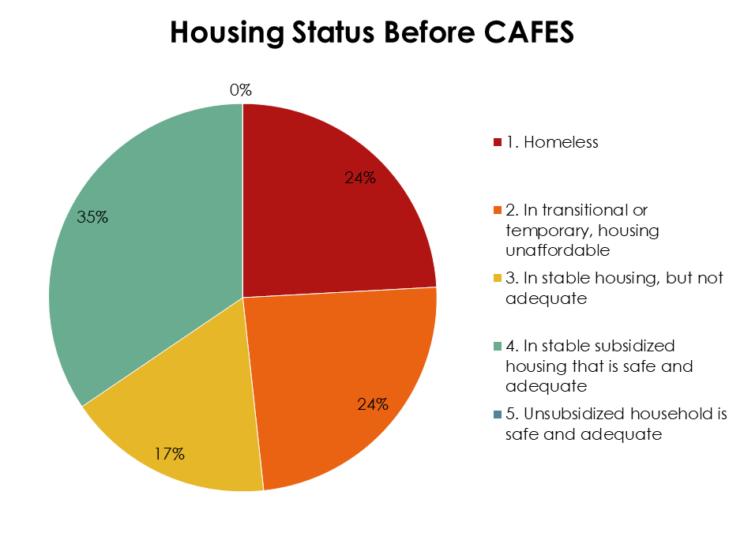
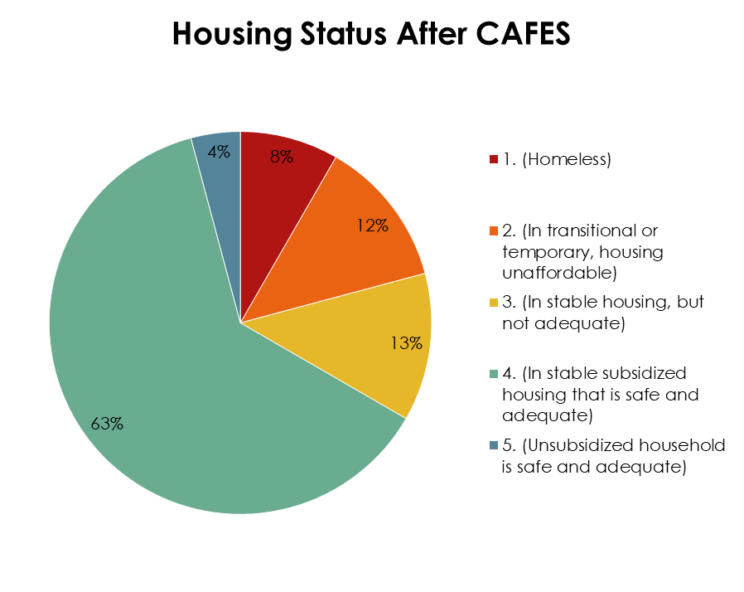
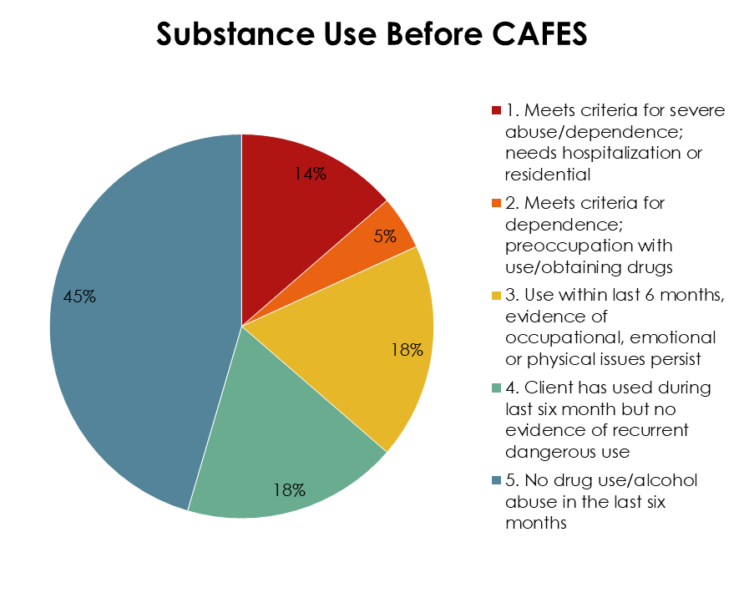
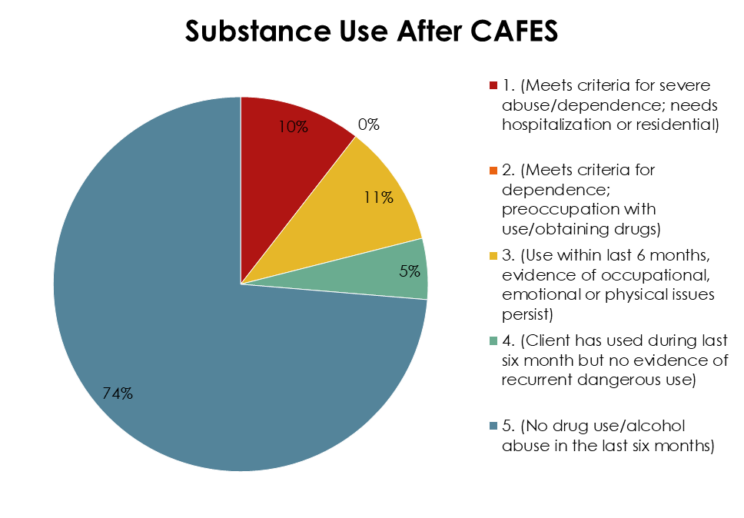
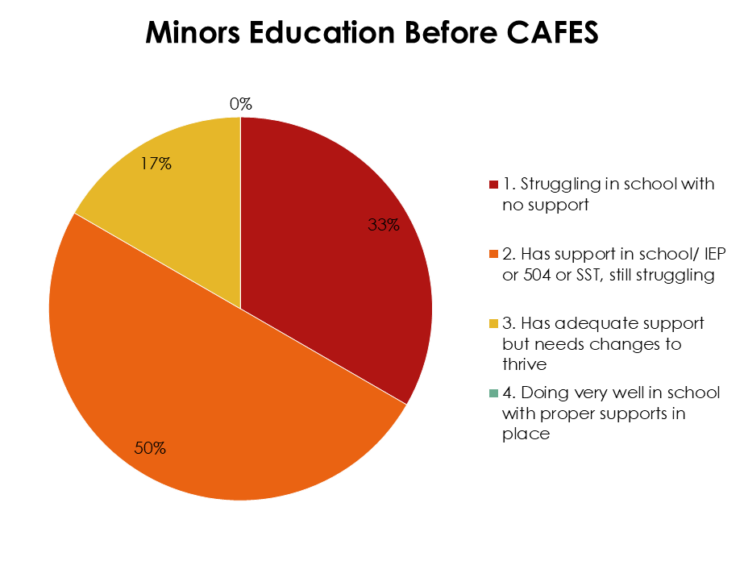
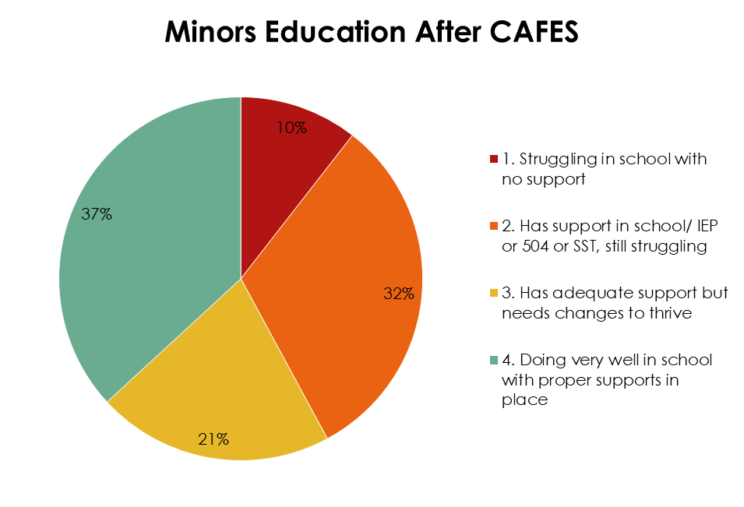
And, of course, there’s a ripple effect. “The program’s holistic approach to working with the parents and attorneys has had an incredible impact on the transparency of the dependency system,” says Judge Monica Wiley, supervising judge of San Francisco Unified Family Court. “San Francisco is always on the cutting edge of collaborative alternatives to the adversarial system, and parents now have another advocate to help them navigate the dependency system, and the court has another source of reliable information. The program has led to faster and better outcomes for our community.”
“This—empowering the client [with the help of CAFES]—is the social work I dreamed of all of my career,” says Ducati. “It’s all the wins. You really know they’re making a difference."
Kathleen Guthrie Woods is a long-time contributor to San Francisco Attorney magazine. Previous articles include “Meet Nemo, San Francisco United Family Court’s Facility Dog” (Winter 2018) and “For the Kids: Arguments in Favor of Right to Counsel” (Summer 2019).

